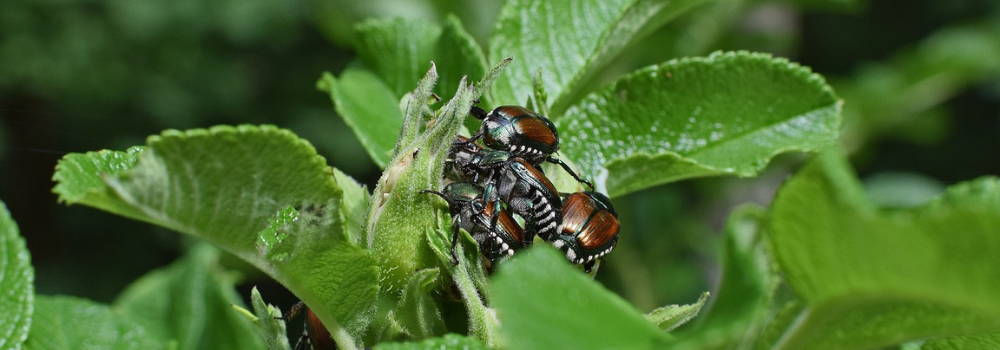Is the Japanese Beetle an Invasive Species
Popillia Japonica or popularly known as the Japanese Beetle is an invasive pest affecting plants. This plant pest was introduced to eastern North America as well as in the United States in 1916 from Japan. It probably came as larvae in the soil of imported plants.
Japanese beetle, Popillia japonica is metallic green with two wing covers in bronze and both sides of its abdomen have six white tufts of hair each. It is oval-shaped and is about 1 cm in length.
On the other hand, the Japanese beetle larvae look more like a chafer beetle and other C-shaped grubs that are creamy white. These are found in soil as they find their food sources mainly underground. The tip of its abdomen also has two white hair patches.
With the larvae, you will see the legs easily. Though they look like other white grubs, you can distinguish them by examining them carefully. Its hairs on the underside of the abdomen and the pattern of its spine are different from other grubs.
These beetles feed on over 200 plant species including roses, grapevines, blueberries, grasses, shrubs, nursery plants, and trees. Adults are known as heavy feeders and attack foliage, flowers, and fruits. While larvae target the roots of other plants as well as turfgrass.
Why are Japanese Beetles Considered as Pests?
Given that these insects are invasive species, adult Japanese beetles skeletonize leaves and consume flowers and fruit. When a property is infested with these pests, they create significant damage on the landscape plants, fruits and vegetable gardens, ornamental plants, orchards, crops, and nurseries.
Unlike adults feeding off visible plants, shrubs, fruits, flowers and trees, the larvae are feeding off roots of plants and turf. This can lead to serious damage to sports fields, lawns, turf production, and golf courses.
The larvae chew the grassroots, which causes the roots to turn brown and eventually die. Turf that is damaged by grub can be pulled up the soil easily like a loose carpet.
They are known as gregarious insects. They often feed in large groups on a single tree. Say, for example, they swarm over a peach tree, they can denude it within 15 minutes and leave nothing but the fruit pits and bare branches.
Though the adults are active flyers, the natural spread of an infestation is slow. They are also unable to travel long distances.
For these beetles to reach long distances, they usually hitchhike on any plant materials be it the soil or the roots. They can also hitchhike on planes, trains, or cars. This is the main reason why government departments responsible for food inspection are working to lessen the human-assisted spread of Japanese beetles to other areas.
Government departments like CFIA or Canadian Food Inspection Agency are placing Japanese beetle traps across Southern British Columbia. It is done every summer as a part of their surveillance network to know its new introductions to other places.
Each trap has a pheromone as well as a plant volatile that will attract more beetles. It was in 2017 when the first Japanese Beetle was found in British Columbia and was found in traps placed by CFIA near False Creek in Vancouver.
What to Do When You See Japanese Beetle in Your Area
If you are living around North America and you found these insects in your area, it is recommended that you contact CFIA. This way, you can make sure that experts will act accordingly and do the necessary steps in controlling a possible infestation.
As mentioned, CFIA places trap during the summer, so avoid moving and tampering it if you find them near your place.
When you learned of any areas where these insects are reported, avoid moving the soil, pruning waste, plants with soil, and other plant debris from that area. This will lessen the chance of spreading it to your area.
Some products we recommend for dealing with these insects are Rescue Japanese Beetle Trap, Safers Japanese Beetle Trap, Green Earth Japanese Beetle Trap, or the Scotts Grub B Gon Grub Killer.


